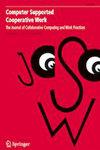旅行商问题的强化学习驱动迭代贪心算法
IF 2.3
3区 计算机科学
Q3 COMPUTER SCIENCE, INTERDISCIPLINARY APPLICATIONS
Computer Supported Cooperative Work-The Journal of Collaborative Computing
Pub Date : 2023-05-24
DOI:10.1109/CSCWD57460.2023.10152696
引用次数: 0
摘要
本文研究了旅行商问题(TSP),该问题在现实世界中具有重要的应用。提出了一种强化学习驱动的迭代贪婪算法(RLIGA)来解决TSP问题。为了生成高质量的初始种群,提出了一种基于著名的FRB2启发式算法的种群初始化方法。为了提高RLIGA算法的有效性,设计了城市序列的局部搜索方法和破坏-重建机制。提出了一种基于当前种群序列信息的子种群生成方法。提出了一个接受标准来确定后代是否被种群收养。为了避免算法陷入局部最优,提出了一种重新破坏和重建的方法。最后,在TSPLIB基准测试实例上对RLIGA进行了测试。实验结果表明,RLIGA算法是解决这一问题的有效算法。本文章由计算机程序翻译,如有差异,请以英文原文为准。
A Reinforcement Learning-driven Iterated Greedy Algorithm for Traveling Salesman Problem
This paper investigates a traveling salesman problem (TSP), which has important applications in real-world scenarios. A reinforcement learning-driven iterated greedy algorithm (RLIGA) is presented to address the TSP. A population initialization method based on the famous FRB2 heuristic is proposed to generate an initial population with high quality. To enhance the effectiveness of the RLIGA, the local search method and the destruction-construction mechanisms are designed for the city sequence. A generation method of sub-population based on current population sequence information is proposed to generate sub-population. An acceptance criterion is proposed to determine whether the offspring are adopted into the population. A re-destruction and re-construction method is proposed to avoid the proposed algorithm falling into local optimum. Lastly, the RLIGA is tested on the TSPLIB benchmark instances. The experimental results show that RLIGA is an effective algorithm to address the problem.
求助全文
通过发布文献求助,成功后即可免费获取论文全文。
去求助
来源期刊

Computer Supported Cooperative Work-The Journal of Collaborative Computing
COMPUTER SCIENCE, INTERDISCIPLINARY APPLICATIONS-
CiteScore
6.40
自引率
4.20%
发文量
31
审稿时长
>12 weeks
期刊介绍:
Computer Supported Cooperative Work (CSCW): The Journal of Collaborative Computing and Work Practices is devoted to innovative research in computer-supported cooperative work (CSCW). It provides an interdisciplinary and international forum for the debate and exchange of ideas concerning theoretical, practical, technical, and social issues in CSCW.
The CSCW Journal arose in response to the growing interest in the design, implementation and use of technical systems (including computing, information, and communications technologies) which support people working cooperatively, and its scope remains to encompass the multifarious aspects of research within CSCW and related areas.
The CSCW Journal focuses on research oriented towards the development of collaborative computing technologies on the basis of studies of actual cooperative work practices (where ‘work’ is used in the wider sense). That is, it welcomes in particular submissions that (a) report on findings from ethnographic or similar kinds of in-depth fieldwork of work practices with a view to their technological implications, (b) report on empirical evaluations of the use of extant or novel technical solutions under real-world conditions, and/or (c) develop technical or conceptual frameworks for practice-oriented computing research based on previous fieldwork and evaluations.
 求助内容:
求助内容: 应助结果提醒方式:
应助结果提醒方式:


